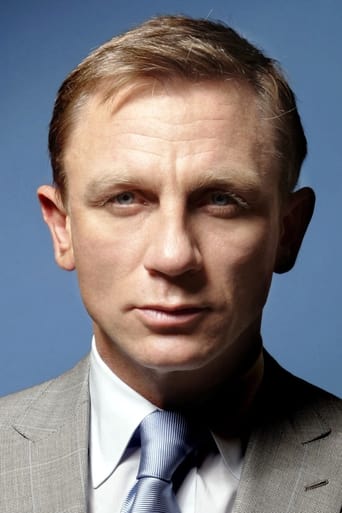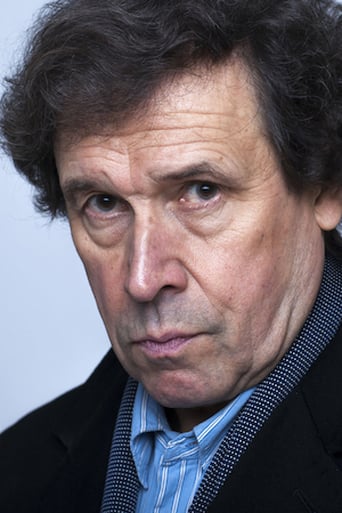Humaira Grant
It’s not bad or unwatchable but despite the amplitude of the spectacle, the end result is underwhelming.
Zlatica
One of the worst ways to make a cult movie is to set out to make a cult movie.
Kimball
Exactly the movie you think it is, but not the movie you want it to be.
paulw7
Ostensibly about a meeting between Niels and Margrethe Bohr and Werner Heisenberg at Bohr's home in Copenhagen in 1941. Physics, relativity and quantum mechanics collide with geopolitics, morality, existentialism, humanity and friendship in a few moments of time, told and re-told as seen from different perspectives.The first part intriguing perspectives on events of history. It builds into a potentially cataclysmic clash of relatives, memories and thought experiments and is ultimately about these few precious moment of life that are grated us and what we choose to do with them.Copenhagen was a brilliant play and is a superb film. I find myself intrigued, engaged and uplifted.
Dennis Littrell
(Note: Over 500 of my movie reviews are now available in my book "Cut to the Chaise Lounge or I Can't Believe I Swallowed the Remote!" Get it at Amazon.)Most viewers of this extraordinary play believe that it doesn't answer the question of why Werner Heisenberg came to Copenhagen in 1941 to visit his mentor Niels Bohr. And this is true: playwright Michael Frayn does not give a definitive answer to that intriguing question. But he does give an interpretation.We must go to the "final draft" of their recapitulation of what happened--the "their" being the three of them, Heisenberg, Bohr and his wife Margrethe, who appear as ghosts of themselves in the now empty Bohr residence. In the climatic revisionist scene, instead of walking away from Heisenberg in the woods, Bohr contains his anger and confronts his one-time protégé. He tells Heisenberg to do the calculation to determine how much fissionable material (a "critical mass") would be necessary to sustain a chain reaction.Heisenberg had believed without doing the calculation that the amount was somewhere near a metric ton. As he does the calculation in his head he realizes that the amount would be much, much less, only 50 kilos. This changes everything because it made the bomb entirely possible. Frayn's point is that it is far better that Bohr did not tell Heisenberg to do the calculation because if he had, it is possible that Nazi Germany would have developed an atomic bomb under Heisenberg's direction. But this does not answer the question of why Heisenberg came to Copenhagen. Margrethe has her own answer: he came to show himself off. The little man who is now the reigning theoretical physicist in Germany had come to stand tall and to let Bohr, who was half Jewish, know that he could save him from the Nazis.This is the "psychological" answer and it plays very well. Heisenberg, like most Germans felt humiliated by the defeat in the Great War and had suffered severely in the economic deprivations that followed. And like most Germans Heisenberg, who was not a Nazi, compromised his principles by acquiescing in Nazi rule because he believed that it would return Germany to "its rightful place" as an economic and military leader in the world. He came to Copenhagen in 1941 in triumph. His triumph, understandably, was not well received.The more blunt question of did Heisenberg expect to find out whether the Americans were making a bomb or to get Bohr to help with the German project is also answered in a psychological way. The answer is no, because he knew that Bohr would not help him even if he could. As it turns out at the time Bohr had no knowledge of what the Allies were doing. The other question, a question that would haunt Heisenberg for the rest of his life, was did he delay the German bomb project in order to prevent the Nazis from acquiring the bomb--as he claimed--or was the fact that they were not able to develop a bomb just a matter of not having the ability? To this question playwright Frayn's answer is that Heisenberg would have developed the bomb if he had been able. This answer is the generally accepted one based on the historical evidence, part of which comes from some careless words from Heisenberg himself that were recorded by British intelligence after Heisenberg was captured and sent to England. What Frayn does so very well in his brilliant play is show us that Heisenberg's need to succeed and his need to feel national pride would not allow him to behave otherwise.The direction of this PBS production by Howard Davies relies heavily on an interesting device. Bohr's wife becomes an objectifying factor who is able to step back from the emotional situation and to see both men clearly and to guide the audience toward an understanding of their relationship. Over the years, she and Bohr served as surrogate parents to Heisenberg. He was the little boy who came home to his parents in 1941 to say, Look at me. I am a great success. Only problem was his "success" could not be separated from the Nazi occupation of their country, and Heisenberg was too obtuse and insensitive to see that.In truth, Heisenberg was not entirely aware of his own motivation. He did not know why he came to Copenhagen. Neither did Bohr. But Margrathe did. An accompanying point to this idea is the story of Bohr bluffing Heisenberg and others during a poker game some years before. It appeared from the fall of the cards that it was extremely unlikely that Bohr had made a straight that would win the pot, and yet he kept on betting until all the others threw in, and then when he showed his hand, he had no straight. He had fooled himself. Frayn's position is that in believing he had come to Copenhagen for innocent reasons, Heisenberg was unconsciously fooling himself. Furthermore the fact that he had not done the calculation was equivalent to Bohr's not looking back at his hole cards to see what he really had.This is not an easy play, but the ideas are presented in a clear manner so that any reasonably intelligent person can understand them. Frayn employs an elaborate metaphor involving Heisenberg's famous uncertainty principle to elucidate the relationship between Bohr and Heisenberg. They are particles that will collide: Heisenberg the elusive electron, neither here nor there, the very essence of uncertainty, Bohr the stolid neutron. Davies has the two circling and circling one another, even chasing one another, as in a dance while Margrathe watches.I found the play moving and ultimately cathartic as all great plays should be. Davies' direction and the sense of time and place greatly facilitated my enjoyment. And the acting by Stephen Rea (Bohr), Daniel Craig, and in particular, Francesca Annis, was outstanding.
blue_sundog
This is well done and thoroughly enjoyable portrayal of the moral hesitation and dissembling that go hand and hand with Heisenberg and his efforts with respect to the bomb. It is well acted with informative and intelligent dialogue that brings two of the leading scientists of the 20th century to life while examining all facets of the issues surrounding Heisenberg's visit to Copenhagen and the consequences of his efforts to develop a bomb for Nazi Germany.
F Gwynplaine MacIntyre
I saw Michael Frayn's stage play 'Copenhagen' in London ... in fact, I was technically *IN* the play, as Peter Davison's set design seated some of the audience members onstage directly above the actors, like a tribunal sitting in judgment, and I chose to watch the play from one of these onstage seats. (I also saw the play on Broadway in the same circumstances, so technically I was onstage during both productions.) This brilliant drama is basically an interplay of ideas between three highly intelligent minds: a concept which works better onstage than in a film or a teleplay. So, when 'Copenhagen' was adapted for television by the BBC, I was eager to see how they would 'open up' this story ... and whether or not the transition would work.It works astonishingly well. During the Second World War, brilliant young physicist Werner Heisenberg was in Germany, working towards the Nazi government's efforts to develop a nuclear bomb. Meanwhile, Heisenberg's older mentor and friend, Niels Bohr, was working quietly in his native Denmark (under Nazi occupation at the time) along with his wife Margrethe. Bohr's wife was not a trained physicist, but many people who knew the Bohrs stated that she was an active partner in his work, and that Mrs Bohr deserves to share credit for Bohr's achievements. In 1941, Heisenberg journeyed to Copenhagen to visit his old friends the Bohrs, although their disparate allegiances during the war had strained the friendship. To this day, historians debate why Heisenberg visited the Bohrs at this time. Also debated is Heisenberg's loyalty to the Nazi cause. Did Heisenberg actively try (and fail) to develop an atomic bomb for the Third Reich? Or was Heisenberg secretly an anti-Nazi who covertly harmed the German war effort by pretending to work on the bomb whilst sabotaging his labmates' efforts? As with the assassination of JFK, there are many different theories as to what 'really' happened here. Heisenberg devised the Uncertainty Principle of quantum physics, so it's ironic that we can never be certain about what really occurred in Copenhagen.The TV version of 'Copenhagen' is brilliant. The action is opened up by having Heisenberg journey to Copenhagen (on a vintage 1940s railway train) while an internal monologue plays on the soundtrack. When he meets the Bohrs, the three of them stroll through various (extremely beautiful) buildings and landmarks in Copenhagen, with an occasional Nazi soldier walking past to remind us that Denmark is effectively part of the Third Reich. The period detail is impeccable throughout, and the locations are a delight to look at.The script of this teleplay is actually superior to the stage version. In the stage play, after Bohr is identified as 'the pope of quantum physics', his wife replies: 'yes, you were the pope ... but Einstein was God'. This is a cheap joke, meant to raise a laugh from audience members who recognise Einstein yet who lack of knowledge of Bohr's achievements. With due respect to Einstein, the historical fact is that Niels Bohr achieved far more in the field of quantum physics than any other three scientists combined, including Einstein ... so I was grateful that the Einstein joke was removed here. (Einstein's achievements were in relativity, not quantum theory.) Another, much better line from the stage play is retained, when Heisenberg contemplates the concept of 'quantum morality' ... in other words, the journey from Good to Evil (or vice versa) can only be made in a single quantum leap, with no gradual transition from one state to the other. Intriguing!I wish that the script of 'Copenhagen' (stage or screen version) had included a crucial irony which was mentioned in the playbill of the London production: namely, that most of the important work in the development of the atomic bomb was achieved by Jewish scientists, precisely **because** of policies implemented by the Nazi government. In Nazi Germany, applied physics was considered a much more prestigious field of research than theoretical physics, so Jewish scientists were shut out of employment opportunities in the former, and they concentrated their research efforts in the latter ... which was the field that developed the atomic bomb.The excellent actor Stephen Rea does fine work as Bohr, and his castmates are splendid too. If you're looking for car chases or action sequences, 'Copenhagen' is not for you. But if you want to experience brilliant acting, sumptuous locales and an exchange of provoking ideas, then I recommend 'Copenhagen' ... and I rate this TV movie 10 points out of 10. This fascinating drama won't Bohr you. (Sorry, I couldn't resist!)

